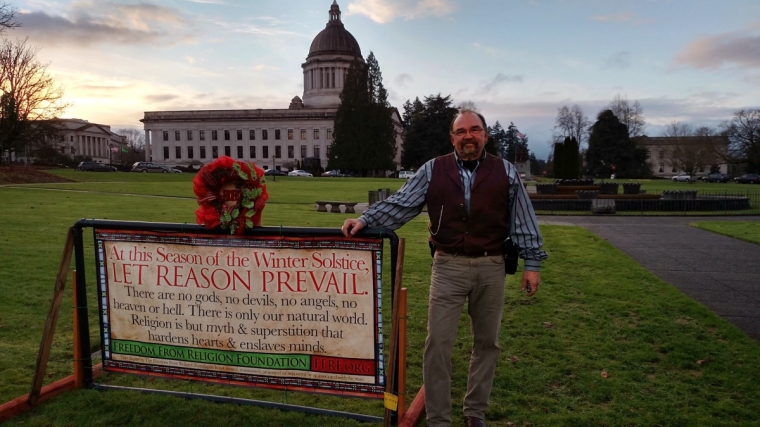Atheist group places 'winter solstice' sign on Washington capitol grounds

OLYMPIA (Christian Examiner) – Not far from a privately constructed nativity scene on the grounds of the state capitol in Olympia, Wash., the litigious Freedom from Religion Foundation has erected its on holiday display commemorating the winter solstice.
The sign posted by the atheist group reads, "At this season of the Winter Solstice, may reason prevail. There are no gods, no devils, no angels, no heaven or hell. There is only our natural world. Religion is but myth and superstition that hardens hearts and enslaves minds."
Our sign is a reminder of the real reason for the season, the Winter Solstice. ... Christians don't own the month of December.
According to the group, the sign serves two purposes. For one, it is meant to encourage the government of the state to allow no religious displays on its grounds as the group believes such displays, even when privately funded, are unconstitutional. Second, however, is that the display is meant to be a poke in the eye with a sharp stick for Christians.
"Our sign is a reminder of the real reason for the season, the Winter Solstice," Dan Barker, co-president of the atheist group, said. "Christians don't own the month of December."
The sign was placed – with permission from the state – by Barker's brother, Darrell, who is the state representative for FFRF in Washington. The group claims it has 1,042 members in the state.
FFRF also said Barker received a permit to keep the display on the grounds until the time the nativity scene is taken down at the end of the year.
This is the fourth time FFRF has displayed one of it signs on the capitol grounds since 2008. They started doing it in when a private group announced then that it planned to erect a life-size nativity scene.
"Religious, and irreligious displays, do not belong at the seats of government in public-owned government buildings, FFRF maintains, but if religion is going to be there, there must be 'room at the inn' for irreligion as well," FFRF said in its statement.
The winter solstice, the shortest day and longest night of the year, takes place on either Dec. 21 or 22, depending on the time zone. FFRF calls the day a "natural holiday."
On the same day FFRF was trumpeting the placement of the winter solstice sign, Anne Nicol Gaylor and Annie Laurie Gaylor, said in a statement that the group doesn't mind sharing the season with Christians, "but we don't like their pretense that it is the birthday of Jesus. It is the birthday of the Unconquered Sun – Dies Natalis Invicti Solis."
Annie Laurie Gaylor is co-president of FFRF.
"Christmas is a relic of sun worship. For all of our major festivals, there were corresponding pagan festivals tied to natural events. We've been celebrating the Winter Solstice, this natural holiday, long before Christians crashed the party. For millennia, our ancestors in the Northern Hemisphere have greeted this seasonal event with festivals of light, gift exchanges and seasonal gatherings," the Gaylors wrote.
"We nonbelievers are quite willing to celebrate the fun parts of anybody's holidays. We just want to be spared the schmaltz, the superstition — and the state/church entanglements."
That ancient peoples celebrated the winter solstice, summer solstice and other celestial events – often with religious connotations – is not in question by Christians and never has been.
The exact date of Jesus' birth is not known, though the fact that shepherds were "abiding in the field" indicates it was likely in the spring or autumn. Christmas, as a Christian holiday, first appeared on the Roman calendar in 336 during the reign of Constantine I, the first Christian emperor of the Roman Empire. It likely was an overlay on the pagan holiday, established by Emperor Aurelian in A.D. 245.
However, early Christian writers, such as Tertullian, believed the coming of the messiah was announced to Mary on March 25, and that Jesus was born nine months later, on Dec. 25. This March date for the annunciation was closely tied with the Jewish Passover in the year some early writers believed he was born. Some in the church, however, fixed the date of the annunciation at April 6, providing the January 6 Christmas date still observed by Christians in the Eastern Orthodox community.
Though the early Christians did not celebrate Christmas as Christians do today, the date of Dec. 25 had significance for Christians long before the winter solstice festival was declared a holiday in 245.